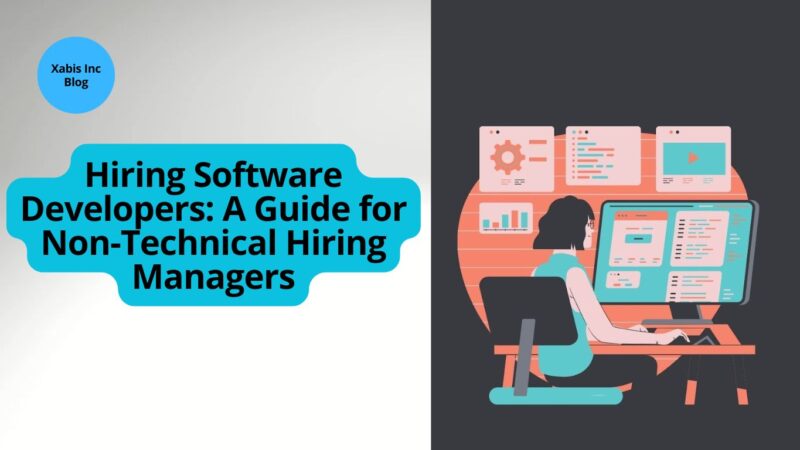iring skilled software developers is a pivotal task that can significantly impact the success and growth of any business in today’s digital economy. For non-technical hiring managers, the challenge is not only to understand the nuances of technical skills but also to ensure the right cultural fit and problem-solving abilities in potential hires.
This guide provides comprehensive insights into the process, helping you to hire software developers effectively, even without a technical background.
Essential Insights for Non-Tech Hiring Managers
Navigating the complexities of hiring software developers can be daunting for those without a technical background. Understanding what makes a good developer and how to assess their skills are key steps in making informed hiring decisions.
This article aims to demystify the process and arm you with the knowledge you need to identify and secure top software development talent.
1. Understanding the Basics of Software Development
How can enhancing your understanding of software development languages and processes improve your communication with potential candidates?
Even if you’re not a developer yourself, having a basic understanding of what software development involves can greatly aid in the hiring process. Familiarize yourself with the most common programming languages such as Java, Python, and C#, and understand the differences between front-end, back-end, and full-stack development. Consider taking a short online course or attending workshops to grasp the fundamentals of coding and software development processes.
2. Defining the Role and Requirements
Before you start looking for candidates, it’s crucial to clearly define the role and the specific skills required. This helps in filtering candidates and ensures you’re looking for the right skill set. Be specific about the technologies the developer will work with and the types of projects they will handle.
Specify whether you need a specialist in a certain area or a generalist who can handle multiple aspects of development. Clear and precise job descriptions can enhance the hiring process by attracting qualified and skilled applicants. It’s no longer a mere piece of paper but a prerequisite for recruiting quality talent.
3. Leveraging Technical Assessments and Coding Tests
To accurately assess the technical skills of your candidates, incorporate standardized coding tests and technical assessments into your hiring process. These tools provide objective metrics on a candidate’s coding ability and problem-solving skills.
Utilize platforms like HackerRank, Codility, or GitHub to evaluate coding skills and review samples of candidates’ work.
4. Conducting Structured Interviews
Structured interviews where candidates are asked the same set of questions can help in fairly assessing their problem-solving and critical thinking abilities. Incorporate scenarios or hypothetical problems related to your business to see how they approach problem-solving.
Use behavioral interview questions to understand how the candidate has handled past situations and challenges. Present them with real-world scenarios to understand their approach to daily business operations.
Structured interviews are twice as effective in predicting job performance than unstructured ones.
5. Checking Cultural Fit and Soft Skills
When you hire software developers go beyond technical skills assessment. Evaluate a developer’s holistic suitability in terms of soft skills and cultural compatibility. Assess their communication skills, teamwork, adaptability, and alignment with your company’s values and culture.
Ensure that the developer can thrive in your company’s environment by discussing values, expectations, and team dynamics. Evaluate the candidate’s potential to integrate and contribute positively to your existing team culture.
6. Partnering with Technical Recruiters
If you find it challenging to assess technical skills, consider partnering with specialized technical recruiters or consulting services. These professionals can help in screening candidates and ensuring that they meet your technical and cultural requirements.
Technical recruiters often have a ready pool of vetted candidates, which can streamline and accelerate the hiring process to eliminate the hiring gruntwork.
7. Utilizing Referral Networks
Leverage the networks of your existing team members who may have connections to skilled developers. Employee referral programs can be an effective way to reach candidates who come well-recommended and might fit well within your team dynamics.
Referrals can decrease the time to hire and increase the chances of a candidate’s success in your organization due to pre-existing endorsements. You could also consider setting up incentives for employees who refer successful candidates as a means to motivate and reward them.
8. Understanding Project Management Tools
While you may not need to know how to code, understanding the tools that developers use to manage their projects can be beneficial. Familiarize yourself with tools like Jira, Trello, or Asana, which help in tracking project progress and managing tasks.
This knowledge will not only help you communicate more effectively with your tech team but also give you insights into how prospective candidates might manage their workflow. Ask candidates about their experience with these tools during interviews to gauge their project management skills. Besides, knowledge of project management tools can improve team collaboration and efficiency.
9. Attending Industry Meetups and Tech Conferences
Participating in tech industry meetups and conferences can provide insights into current trends and also connect you with potential candidates. These events are great for networking and learning more about the tech community and the latest technologies that impact software development.
Showing a presence at such events can also enhance your company’s image as an engaged and knowledgeable employer in the tech community.
10. Offering Competitive Benefits and Continuous Learning Opportunities
To attract top software development talent, it’s important to offer competitive benefits that go beyond salary. Emphasize opportunities for professional development, such as access to courses, workshops, and seminars that encourage continuous learning and skill enhancement.
Highlight how your company supports ongoing education and career growth, which can be a major draw for talented developers looking for employers who invest in their employees.
Companies that invest in employee training and development can significantly improve staff retention rates and the income per employee.
Closing Remarks
By following these guidelines, non-technical hiring managers can effectively navigate the complexities of recruiting software developers. The key is to balance understanding technical requirements with assessing the cultural fit and potential for growth within your organization. This holistic approach ensures that you not only hire software developers who are competent but also who will contribute to your company’s long-term success.








